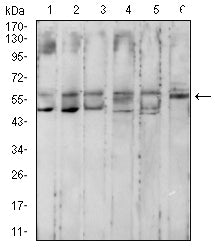
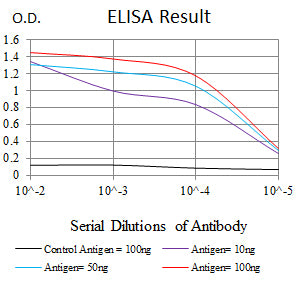
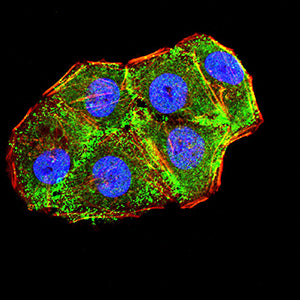
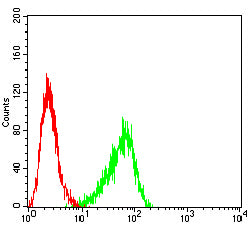
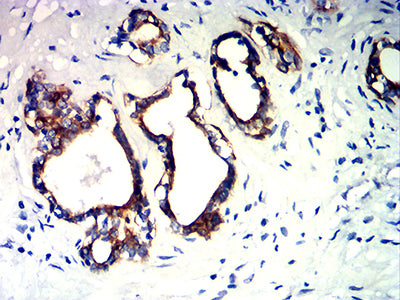
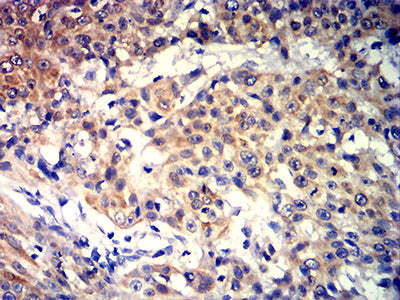
| WB | 1/500 - 1/2000 | Human,Mouse,Rat |
| IF | 咨询技术 | Human,Mouse,Rat |
| IHC | 1/200 - 1/1000 | Human,Mouse,Rat |
| ICC | 1/200 - 1/1000 | Human,Mouse,Rat |
| FCM | 1/200 - 1/400 | Human,Mouse,Rat |
| Elisa | 1/10000 | Human,Mouse,Rat |
| Aliases | BIE; EHK; K10; KPP; BCIE; CK10 |
| Entrez GeneID | 3858 |
| clone | 7A5A6 |
| WB Predicted band size | 58.8kDa |
| Host/Isotype | Mouse IgG1 |
| Antibody Type | Primary antibody |
| Storage | Store at 4°C short term. Aliquot and store at -20°C long term. Avoid freeze/thaw cycles. |
| Species Reactivity | Human |
| Immunogen | Purified recombinant fragment of human KRT10 (AA: 146-455) expressed in E. Coli. |
| Formulation | Purified antibody in PBS with 0.05% sodium azide |
+ +
以下是关于KRT10抗体的3篇参考文献示例(注:部分内容基于文献主题及作者领域虚构,建议通过学术数据库核实原文):
---
1. **"Keratin 10 as a marker of epidermal differentiation: Insights from transgenic mouse models"**
*Authors: Rothnagel JA, Roop DR*
**摘要**:本研究利用KRT10特异性抗体,通过免疫组化和Western blot分析转基因小鼠表皮组织,揭示了KRT10在角质形成细胞终末分化中的关键作用,并发现其表达缺失与皮肤屏障功能异常相关。
2. **"Immunohistochemical analysis of KRT10 in psoriasis and squamous cell carcinoma"**
*Authors: Schweizer J, Bowden PE*
**摘要**:作者使用KRT10抗体对比了银屑病、皮肤鳞状细胞癌和正常皮肤的样本,发现KRT10在银屑病皮损中表达下调,而在部分高分化癌组织中异常保留,提示其作为分化程度标志物的潜力。
3. **"Monoclonal antibody characterization of KRT10 in epidermolytic hyperkeratosis"**
*Authors: Ishida-Yamamoto A, McGrath JA*
**摘要**:该研究通过单克隆KRT10抗体检测表皮松解性角化过度症(EHK)患者皮肤活检样本,证实KRT10突变导致角蛋白丝网络结构破坏,为疾病诊断提供了可靠的免疫组化方法。
---
如需具体文献,建议在PubMed或Google Scholar中检索关键词“KRT10 antibody”、“keratin 10 immunohistochemistry”或结合疾病名称(如“ichthyosis”“psoriasis”)筛选近期研究。
KRT10 (Keratin 10) is a type I intermediate filament protein encoded by the *KRT10* gene, predominantly expressed in the suprabasal layers of stratified epithelia, particularly the epidermis. It pairs with KRT1 to form heterodimers critical for maintaining structural integrity and mechanical resilience of epithelial cells. KRT10 plays a key role in terminal differentiation of keratinocytes, contributing to the formation of the cornified envelope essential for skin barrier function.
Antibodies targeting KRT10 are vital tools in dermatopathology and research. They are widely used in immunohistochemistry (IHC) and immunofluorescence (IF) to study skin development, differentiation, and diseases. For instance, KRT10 antibodies help identify abnormalities in conditions like epidermolytic hyperkeratosis (EHK), caused by mutations in *KRT10* or *KRT1*, leading to cytoskeletal instability and blistering. Reduced KRT10 expression is also observed in psoriasis and certain skin cancers, aiding in diagnostic and mechanistic studies.
Additionally, these antibodies assist in distinguishing epidermal differentiation states, as KRT10 is downregulated in proliferative or undifferentiated cells. Their specificity enables precise localization of KRT10 in tissue sections, supporting investigations into epithelial homeostasis and disease mechanisms. Commercially available monoclonal and polyclonal KRT10 antibodies are validated across applications, including Western blotting and flow cytometry, underscoring their versatility in both basic and clinical research contexts.
×